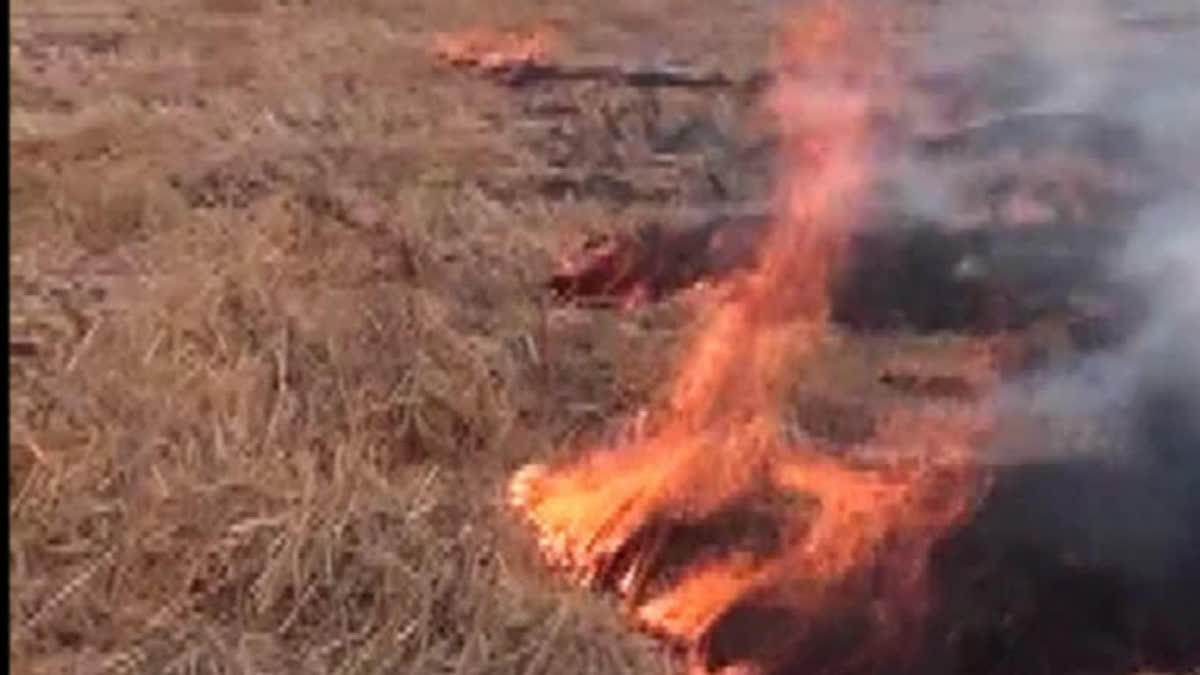New Delhi:The Commission for Air Quality Management (CAQM) in the National Capital Region (NCR) and adjoining areas has informed the Supreme Court that it has developed a framework for the prevention and control of paddy stubble burning and effective management techniques for paddy stubble. The Commission said the high incidence of paddy stubble burning in Punjab and Haryana has been a matter of serious concern and has been contributing adversely to the air quality scenario in the NCR, particularly during the winter. According to the Commission's data Punjab farm fire count has dropped to 49,922 in 2022, from 83,002 in 2020, and for Haryana from 4,202 in 2020 to 3,661 in 2022.
Delhi-NCR's air quality deteriorated further on Saturday. On November 3, it breached the ‘400’ danger mark on a scale of 500 with AQI reaching alarming levels in several places. According to the Central Pollution Control Board (CPCB) data Anand Vihar Station, Punjabi Bagh Station, Mundka Station recorded AQI levels in the ‘severe’ category that is above 400 AQI mark. Severe air pollution has prompted a ban on non-essential construction work and the closure of primary schools in the capital on Friday evening, and restrictions have been also imposed on diesel and petrol vehicles operating in and around Delhi.
In a report filed in the apex court, the Commission said prevention and control of paddy stubble burning has been a high-priority sector for it and after detailed deliberations and discussions with Punjab, Haryana, UP, Rajasthan, Delhi, Pollution Control Boards of NCR states and Delhi Pollution Control Committee (DPCC) and various other stakeholders, it has developed a framework for prevention and control of paddy stubble burning and effective management techniques for paddy stubble.
The Commission issued statutory directions to the State governments of Punjab, Haryana and Uttar Pradesh to prepare detailed and monitorable state-specific action plans, based on the following six major components/pillars of action, as provided under the framework: plans/schemes to reduce generation of paddy straw; in-situ crop residue management; ex-situ crop residue management; sensitisation and education through electronic media, social media, print media; effective monitoring/enforcement and prohibition of stubble/crop residue burning.
Also read:Delhi govt identifies 8 more pollution hotspots; will use dust suppressants: Gopal Rai
The Commission said total funds to the tune of Rs.3,333.17 crore have been so far released by the Central government under the Crop Residue Management (CRM) scheme. “The available data indicates that there are around 1,17,672 Crop Residue Management (CRM) Machines available in Punjab, 80,071 in Haryana and 7,986 in the NCR areas of Uttar Pradesh. Additionally, around 23,000 such machines in Punjab, 7,572 in Haryana and 595 in the NCR areas of Uttar Pradesh are in the process of procurement during 2023," said the report.
In its action plan for 2023, the Commission said the targets for a substantial reduction in the fire count on account of paddy stubble burning during 2023 for Punjab, Haryana and UP (NCR) were projected by them in the various review meetings and as per the state action plans. In Punjab, zero stubble burning events were targeted in six districts -- Hoshiarpur, Malerkotla, Pathankot, Rup Nagar, SAS Nagar and SBS Nagar-- and at least 50% reduction in the remaining districts, and the total fire counts were targeted to be reduced to 24,202 from 49,922 in 2022. The Commission also targeted the near elimination of paddy stubble burning in Haryana and UP-NCR.
The Commission said, “Given the compelling need to also control air pollution from coal-based Captive Thermal Power Plants in the NCR, the concerns of the burning of agricultural residue and the potential of its effective utilisation as a resource, the Commission issued direction on March 17, 2023, to all the coal based Captive Thermal Power plants, including co-generating Captive Thermal Power Plants situated in NCR to initiate immediate steps to cofire biomass-based pellets (with focus on paddy straw utilization) with coal through a continuous and uninterrupted supply chain targeting at least 5% co-firing of biomass pellets, latest by September 30, 2023 and at least 10% co-firing by December 31, 2023.
On October 10, the apex court directed the Commission to submit urgently a report as to the steps being taken for control of air pollution in and around the capital and listed the matter for hearing on October 31. The Commission filed the report on October 28. On October 31, the apex court said crop burning is one of the main reasons for air pollution in Delhi and noted that air pollution persists in the national capital despite several remedial steps having been taken by CAQM. The Supreme Court directed Delhi, Punjab, Haryana, Uttar Pradesh and Rajasthan governments to file affidavits enumerating measures initiated by them to control it.
